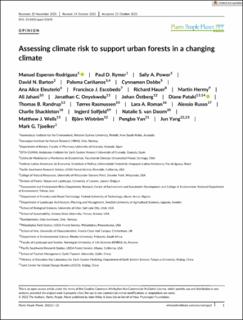| dc.description.abstract | Globally, cities are planning for resilience through urban greening initiatives as governments understand the importance of urban forests in improving quality of life and mitigating climate change. However, the persistence of urban forests and the ecosystem benefits they provide are threatened by climate change, and systematic assessments of causes of tree dieback and mortality in urban environments are rare. Long-term monitoring studies and adaptive management are needed to identify and prevent climate change-driven failures and mortality. Research and monitoring when coupled with systematic forecasting will enable governments to incorporate climate change resilience into urban forestry planning. Future scenarios in which urban forests are resilient or in decline will depend on the management and planning actions we make today. A nivel mundial, las ciudades están expandiendo las áreas verdes a medida que los gobiernos comprenden la importancia de los bosques urbanos para mitigar el cambio climático y mejorar la calidad de vida de los ciudadanos. Sin embargo, la supervivencia de los bosques urbanos y los servicios ecosistémicos que brindan se ven amenazados por el cambio climático y actualmente, son muy raros los estudios sistemáticos sobre las causas de la muerte de los árboles urbanos. Se necesitan estudios de monitoreo a largo plazo y de gestion adaptativa para identificar y prevenir la mortalidad en bosques urbanos provocada por el cambio climático. Dicha investigacion y monitoreo, combinados con predicciones de clima, permitirán a los gobiernos mitigar los efectos adversos del cambio climático a través de la planificacion forestal urbana. Los escenarios futuros en los que los bosques urbanos sean resilientes o estén en declive dependerán de las acciones de gestion y planificacion que realicemos hoy. Summary The management of urban forests is a key element of resilience planning in cities across the globe. Urban forests provide ecosystem services as well as other naturebased solutions to 4.2 billion people living in cities. However, to continue to do so effectively, urban forests need to be able to thrive in an increasingly changing climate. Trees in cities are vulnerable to extreme heat and drought events, which are predicted to increase in frequency and severity under climate change. Knowledge of species' vulnerability to climate change, therefore, is crucial to ensure provision of desired ecosystem benefits, improve species selection, maintain tree growth and reduce tree mortality, dieback and stress in urban forests. Yet, systematic assessments of causes of tree dieback and mortality in urban environments are rare. We reviewed the state of knowledge of tree mortality in urban forests globally, finding very few frameworks that enable detection of climate change impacts on urban forests and no long-term studies assessing climate change as a direct driver of urban tree dieback and mortality. The effects of climate change on urban forests remain poorly understood and quantified, constraining the ability of governments to incorporate climate change resilience into urban forestry planning. tree failure, tree mortality, urban planning, urban sustainability, urban trees | |
